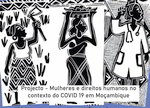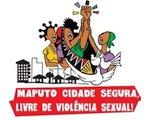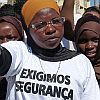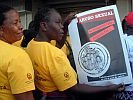Family Law:
Let’s Talk About Equality and Justice
WLSA Mozambique and Fórum Mulher
Fórum Mulher (Women’s Forum) and WLSA Mozambique have produced and published a set of articles on the issue of Family Law, in the ambit of their activities to accelerate the discussion on the proposal of Family Law in Parliament. The articles cover some aspects of the referred proposal, which has been subjected of public debate, aiming at emphasize the needs, expectations and interests of women in Mozambique, with reference to the law.
I – LEGAL FRAMEWORK OF THE PROPOSAL OF THE FAMILY LAW
After waiting a year and a half (since August 2001), the proposal of Family Law is finally scheduled as the 13th point in the agenda of the Parliament session that started in February this year.
We were pleased with the announcement of the event. As a matter of fact, after a long process of work and discussions (the proposal of Family Law started to be discussed in 1998), we found it difficult to understand why political authorities did not prioritise the proposal for immediate discussion in Parliament, for its rapid approval.
In fact, ever since the Government created the Legal Review Committee with the respective Legal Review Sub-Committee for the Family Law, the task of producing a new Family Law has been in the agenda of most women’s organisations in Mozambique with a priority status. Many years, many hours and many resources were invested in a process that finalised with the completion of the present proposal.
Major events of this process should be made known. The article starts by discussing the grounds and the way we envisaged the new Family Law to be.
First, there was a need to discuss what the contents of the new law should exactly be. The following aspects had been taken into account:
- Conformity with for the Constitution of the Republic, which states non-discrimination, based on sex, in articles 66 and 67. Thus, any law infringing this disposition shall be considered unconstitutional.
- Then, the international legal instruments ratified by the Government of Mozambique along the years have to be taken into consideration. Two of them were particularly relevant: the African Chart of Human and Peoples’ Rights and the International Convention Against All Forms of Discrimination Against Women (CEDAW). As generally known, once ratified these conventions come immediately into force.
- Finally yet importantly, there was a need to guarantee the adequacy of the new law relatively to the social and economic realities of the country, at a time of great political, economic and social changes.
This last issue requires a deeper reflection.
When we say the Family Law should reflect the realities of the country it does not mean that the Family Law should be a mirror of existing practices. This would result in the transcription of current practices down on paper (which would certainly be difficult, as plurality characterises our society), thus preventing new changes to take place. We would be assuming that the ways families are currently structured in Mozambique constitute the ideal type and, therefore, the law would enforce everyone to live in accordance with that/those model(s).
That is not what we want. We do not want to set legal boundaries for the new generations, relatively to the way they should behave in the family and their respective position within the household. What we want is to establish normative principles whereby each one’s expectations, hopes and dreams are reflected. It should be noted that nobody, without exception, has the right to impose their vision of the world, of society and of family on others.
This is because we see the Law as an instrument of change. Instrument of change that should increasingly lead us to respect the rights of all citizens, from the eldest to the youngest, independently of race, place of origin, and religious creed, as stated in our Constitution and in the international legal instruments ratified by Mozambique.
Women’s organisations had this in mind when they engaged actively in the production and discussion of successive proposals of the Family Law. In addition to the legal instruments mentioned above, one of the most important supports of this work were the findings of the surveys carried out since independence, which discuss the social dynamics at family level, both in the countryside and in the cities.
In fact, this was our commitment as human rights activists: to participate actively in the development of a law that will respect the principles of equality and justice and guarantee the dignity and respect of each and everyone in the family. Our commitment to a law that will help to correct current asymmetries and inequalities and which will serve as legal support to combat domestic violence; a law that will contribute to make the family a welcome, comfortable and safe place. This is what we need, as men and women, to feel loved and respected.
II – CULTURE AND LAW
The proposal of Family Law to discuss in Parliament contains significant changes in relation to the current Law, which dates back to 1966. That is, it was developed and approved under the hardest period of Salazar dictatorship, when moral and costumes controls were in the hands of the Catholic Church and rigorously defended a conservative moral that strictly limited women’s rights. In Portugal, a few years after the coup d’état of 25th April, the 1966 law was replaced by a more progressive Family Law which took into account the respect for women’s human rights.
Despite all efforts for a legal review of the law in 1978, the process was slow in Mozambique. It was only twenty years later that the review process began, in 1998, and culminated with the development of the current proposal of Family Law.
This enormous delay represents a difficult mystery to solve if we take into account the promises and political ideal of Frelimo. But, looking closer to both the speeches and political practices, maybe some possible answers can be found. Actually, what was said as intentions did not exactly coincide with what was done and is still carried out in practice. The situation is even more evident when we come to women’s human rights.
The problem with a law of such a domain like the family is that anything said related to the family is regarded as part of intimate and private matters. That is, there is some reluctance in considering that what happens at family level has to do with the rest of the society and the country, regulated by a fundamental law, the Constitution, and by principles inscribed in ratified international Conventions that establish basic human rights for all citizens, whether men or women. The practices and social imaginary, where gender asymmetries are firmly anchored, thus come in tension with national and international standards.
The tension is commonly described as culture confrontation. And in the case of the present Family Law proposal to be discussed in Parliament, the issue is expressed in the following terms, “The proposal goes against our culture”, or even “against our religion”. Culture and religion are invoked to limit women’s rights and gain expression in the violation of human rights.
In these claims culture is portrayed as something sacred and, therefore, untouchable. From the very beginning, we refuse to think that culture is something that is set to last forever.
Culture has to be regarded as change and diversity. It is also the legacy from our parents and grandparents that we use in the best possible way, in order to be able to live in such adverse conditions as those we have experienced in the last few years. That is why it can be said that culture is equally the art of surviving with nothing or almost nothing, the creativity that we use everyday in order to be able to provide food, care and education to our children. Culture can only be learnt in this way and in this diversity. It is a monument to the courage and bravery of human being. It is a hymn to those who do not give up, to their strength and perseverance. Thus, culture belongs to all of us, men and women, young and elderly. Our identities and loyalties are part of it and that is where the foundation of our common humanity lies.
Using culture for repression is a monstrous attitude. Using it to justify transgression of human rights is a crime and can only reveal interest in preserving old hierarchies. Culture can thus be converted into a weapon of power that the some use to control others.
Therefore, when they say that gender equality in the Family Law proposal is an attempt on Mozambican culture, the immediate thought is that, in the absence of other arguments, culture is used to neglect women’s rights. Implicitly, it is being said that Mozambican culture is made and controlled by men and that women should be subject to it. Therefore, gender domination is concealed whilst talking about culture priorities.
We would like to conclude by saying that we, women, have the right to live with dignity and in equality with men, in the family and in the society. Our vision of the world, the way we look at life and our practices are all an integrative part of Mozambican culture.
III – WOMEN AND THE FAMILY LAW PROPOSAL
At the very beginning of the process of review of the Family Law, a lawyer asked what we, civil society, had to do with the development of laws and even suggested that we should leave the task for people trained in law. We disagreed, because one thing is to have technical knowledge to be able to write the text of law, and the other is the inalienable right of citizens to propose, discuss and approve the contents of any legislation. It was in this regard that we participated in the whole process.
It was also clear from the beginning that, in addition to direct intervention in seminars organised by the Legal Review Sub-Committee to discuss the successive law proposals, there was a need to expand the debate, to make the project of review of the Family Law known to women other than the human rights women activists. That is what we did. We went to the barrios of the city of Maputo, to neighbouring districts and to all other provinces.
Some NGOs linked to Fórum Mulher, such as MULEIDE, AMMCJ and WLSA Mozambique, organised workshops and meetings addressed to men and women, between the years 1999 and 2000. Topics of the agenda were:
- how will the new law contribute to end discrimination and inequalities between men and women within the family,
- auscultation of the proposals for change of the current law.
The common goal was to make a survey on the expectations in relation to a Family Law, promised so many times and anxiously waited for. There was a commitment to bring such expectations to debate, voicing those who could not be directly involved in the process, despite the efforts of the Sub-Committee to expand initial discussions, organising roundtables and seminars attended by province representatives.
In some cases, we even decided to carry out immediate surveys to evaluate the extent of one or other phenomena and understand their logic of production and reproduction. For example, when it was suggested that the new law should recognise other forms of marriage such as the traditional and the religious marriage, and the de facto union, whilst the law requirements were met, some argued that this latter type of union would be irrelevant out of the city of Maputo and that the law should not, therefore, recognise it. However, surveys carried out indicated an increasing prevalence of de facto unions in rural areas as a result of family de-structuring.
Some of the findings of the discussion process of the proposal of Family law need to be debated. First of all, the question of property sharing in case of divorce or separation was insistently raised; for women living in de facto union the situation becomes even worse because they do not have the law to protect them. Normally, they are deprived of everything, of the land they worked on for years, of the house possessions and in some cases even their personal belongings.
Polygamy was another issue of great concern to women. Despite the commonly accepted view that polygamy is welcome by women in rural areas because it relieves them from the burden of domestic work, we were unable to find a single woman who would defend it. A participant from Maringué even stated that in a polygamous marriage women were “the tractor of the poor”.
Other topics debated were:
- Age of marriage – main concern was on premature marriages, the age of 18 was suggested for both boys and girls. A lot was said regarding ‘children’s rights’, although in an abstract way because participants were unaware of any specific legal instruments.
- Types of marriage – it was pointed out that even knowing that civil marriage is the only valid type of marriage under the current law, it does not always represent a possibility. So it was suggested that people should be free to choose any kind of marriage and demand its recognition, as long as the principles regarding the law were respected: to be a “voluntary and singular union”.
- Family heads – final consensus is that men and women should have the same status in marriage and that no one should rule the other.
- Family residence – in this case the decision should also be made by the two spouses and not by the husband alone.
We have produced brochures and posters focusing on specific aspects, so that people could follow the discussions.
The fact is that the Family Law means a lot to us women, and therefore we have invested the available human and material resources to guarantee wide dissemination of the proposals. However, now that we have completed five years since this process started, we hear that there is a need to restart things and go to the provinces once again to discuss the issue. We are not sure about the intent of this requirement. In fact, it seems this to be another evidence of unwillingness to approve a law that would guarantee equality between men and women in the family. Following the delay of a year and a half to include the proposal of Family Law in the Parliament agenda, now another reason for postponement is found.
We think that it is time for the political decision-makers to show greater commitment in relation to the needs and interests of female population, who are normally excluded from human rights. For this segment of the population, the respect they are entitled to in the family and in society continues to be neglected.
We sincerely hope that this proposal on Family Law will not be decided apart from the legal grounds guaranteed by the Constitution.
IV – FAMILY HEADS
Many people who did not even read the Family Law proposal nevertheless have steady ideas regarding it. One of the things that is most talked about in bars, tea brakes at workplaces and even along Parliament corridors is that this law is intended to have women ruling men. Obviously, confronted with such information men and women have become scandalised and regret this extreme and radical attitude.
In fact, this statement does not correspond to the truth and has been deliberately disseminated to denigrate a proposal of law that took years to be completed, costing immense human and financial resources, and which is so important to improve the situation of women’s human rights. Therefore, we thought that it would be important to clarify what is named as “Family Representation” (Article nr. 1674), for better understanding of the reader and all those interested in this specific aspect of the proposal of Family Law.
In the current Civil Code (of 1966), it is prescribed that the male consort holds the so-called “Marital Power”. Thus, it is stated that, “The husband is the head of the family and he should represent it and decide upon it in all acts of common married life, with no prejudice to the contents of the following articles”.
Therefore, it is not surprising that this particular aspect deserved women’s attention. Are we supposed to continue to accept being treated as second category human beings within our own house? Why is it that working as much as men do, sometimes carrying out even heavier responsibilities, we still have to bow to them?
Thus, in the proposal of Family Law, the expression “Marital Power” is eliminated and replaced by “Family Representation”, stating, “The family can be intrinsically represented by any of the consorts, unless contrary decision is taken by them”.
Obviously there are many arguments to keep husband’s supremacy upon the wife into the law. Part of such arguments is very rude and refers to female and male nature: they make comparisons with the animal world and state that, “In the presence of roosters, hens do not sing”. If we keep quiet, maybe the next thing they will say will be that in a poultry-yard a rooster is never satisfied with only one hen and, therefore, we should include polygamy in the law!
Others argue that men should head the family because he holds greater responsibility in providing for the household. However, this is a false argument. It is true that according to the traditional division of work the role of men should be to guarantee family’s subsistence, while women should look after children, the elderly and the sick, and the various household chores. However, if we look at the findings of the various national surveys, we find that 80% of female labour force is in family sector agriculture, which is the area that guarantees the subsistence of the populations in Mozambique. Thus, we could well say that women are the ones who feed this land.
However, even being aware of this fact, we have no right to demand the inversion of the current law in order to guarantee the heading of the family by women alone. It should be made clear that we, women, are fighting for equality and are strong defenders of rights for all citizens. Men and women should benefit from equal rights and same access to resources. Both of them should have equal opportunities, so that they can fulfil themselves as human beings.
The Family Law previews a family model in which men and women find themselves as companions and organise their life together for a common well-being. This is expressed when they talk of “Family Representation”, but also in Article nr. 1677, on “Administration of Properties”. “Administration of properties in the couple is up to the consorts in circumstances of equality and the couple is should choose dialogue and consensus when taking decisions that may affect common properties or the interests of minor children”.
Who can be against the idea that a family should function harmoniously, regulated by justice and equality principles?
V –AGE OF MARRIAGE
If marriage is an act that requires conscious involvement of the interested parties, then the age at which boys and girls are allowed to marry (age of marriage) is very important. Therefore, in the current Proposal of Family Law the definition of equal age of marriage for both of them has been proposed, thus ending the existing disparities in the current Civil Code. The proposal has been much debated and some people are radically against it.
Arguments presented lay around two major issues: the first is that, from the biological point of view, girls reach physical maturity earlier than boys; the second issue has to do with the fact that it is assumed that when boys marry, they should already have a stable economic situation in order to guarantee sustenance of the new family.
The first argument is offensive to women, because it suggests that in order to get married they have to be physically apt to procreate. In other words, it reduces marriage to reproduction purposes. On the other hand, now we know through scientific studies that there is not any sustaining ground to consider as true the precocity of the physical and psychic development of women. As we can see, there is no scientific sustainability to defend the maintenance of the differential treatment in the law relatively to the age of marriage for boys and girls.
The second argument, that when boys marry they have to be in stable conditions to sustain the new family, is equally much used. Just as we saw in relation to heading the family, the central question is that the roles and functions performed by men and women in the household and in society are classified in a different and unequal way.
Women’s major fate is maternity and the household chores. Men’s fate is to ensure that women are good mothers, good housewives, and good wives. For that, they both learn at an early age about their place in the world and that they should not get out of it. The family, the church and the society are responsible for teaching, enforcing and sanctioning all those (male and female) who once had (and still have) the courage to fight for a dream of equality.
There are many and varied examples of application of the inequality principle in our country. Although women represent 51% of the Mozambican population, only one third of female students complete the first level of primary education. Although women represent 51% of the Mozambican population, over 80% of them are poor farmers. Although women represent 51% of the Mozambican population, well over half of them have never seen a school, never held a pencil, nor have they ever written the word freedom.
Many of us, young girls aged 8, 9 and 10 are taken away from school and married prematurely. In fact, we are handed over as an object to men who steal our youth and dreams.
Families and religious leaders, on behalf of a divine order and of initial inequality, continue to defend that the gods and nature created us like that: emotional, not very intelligent and meant to be housewives. What gods and what nature are these that divide human beings as such?
A different age of marriage for boys and girls is no more than complicity with the violation of human rights, connivance with the exclusion of women from schools, and responsibility to prevent harmonious growth and the power to opt.
Boys and girls should benefit from the same opportunities to grow, to study and to stand as human beings. Our humanity as women does not end in maternity. We want to be free to choose to be wives and mothers. We want to have the same rights and the same possibility of exercising them.
It is not enough for the Constitution of the Republic to defend equality among all human beings. There is a need for legal mechanisms to protect these rights. There is a need to punish all those who transgress human rights in daily and family practice.
We, therefore, demand the approval of the Family Law. That is why we fight and will fight against the hypocrisy of all those who, in the name of culture and religion, want to steal our right of being an integrant part of humanity.
VI – THE PRESS AND THE PROPOSAL OF LAW
We understand, from what is said publicly and privately, that many people have not read the proposal of Family Law, including those who, given their responsibilities, should have done so. Nevertheless, they all comment about one or another specific issue. Where did they get the information? The most important source is the press, and therefore we should examine what was said in the newspapers about the proposal of Family Law.
Normally, newspapers do not just bring about facts, but the journalist who writes the piece of news also transmits his or her point of view and position about the issue in question. Sometimes this is not the intention of the author, but it can be implicit in the way he /she presents the information.
Also regarding the proposal of Family Law the news have never been neutral. Of all articles published on the topic between 1999 and 2000, some messages can be thus summarised:
- The proposal on Family Law is of interest to women above all – almost nobody referred to children’s right, which are widely defended in this proposal.
- The Family Law proposal takes power away from men to pass it on to women: “now women want to rule” – few people took the time to analyse the content of the proposal and see that what it defends is not female supremacy, but equality between men and women.
- The Family Law proposal is promoted by a “small group” of women who do not represent rural women – they did not talk about the various debates carried out in the provinces, organised by female NGOs and by the Legal Reform Sub-Committee. They equally forgot about the seminars and workshops in which successive versions of the current proposal were discussed with the participation of representatives from religious organisations, political groups, and other civil society sectors. Are these also “small groups”?
Sometimes journalists are taken by the intention of being ‘sensational’ and therefore create headlines which attract readers but definitely contribute to forge a common representation on the proposal of Family Law as something odd, radical and attempting on Mozambican culture. Here are some examples:
- “Family Law. Women do not want husbands as family heads” – Savana, 14 of April 2000.
- “Proposal of Family Law: matrimonial revolution about to start” – Domingo, 16 April 2000.
- “In the New Family Law: de facto union is now de facto marriage” – O Popular, 21 April 2000.
So, we can say: the role of part of the press in this process of development of the proposal of Family Law created damage to the interests of women. It contributed to create and consolidate negative representations on the content of the proposal and about those who participated on its development. Few articles really intended to present information to the readers, exempt of prejudices, so that they could make their own opinion.
At this moment in which the proposal of Family Law is to be discussed in Parliament, we would like to make an appeal:
- That the media disseminate its contents. Given the extension of the document, it could be done by covering the matter by chapters, particularly those that introduce changes to the current law.
- That Members of Parliament and the general public read the document if they have access to it, or seek information from the relevant people.
We do not consider it serious, nor honest, to treat a subject of the most importance to women and to the development of the country with such inconsistency. Let us read, study and debate, with an open attitude that should characterise a true democracy, where everyone’s interests and needs are taken into consideration.







 Information in English
Information in English



















